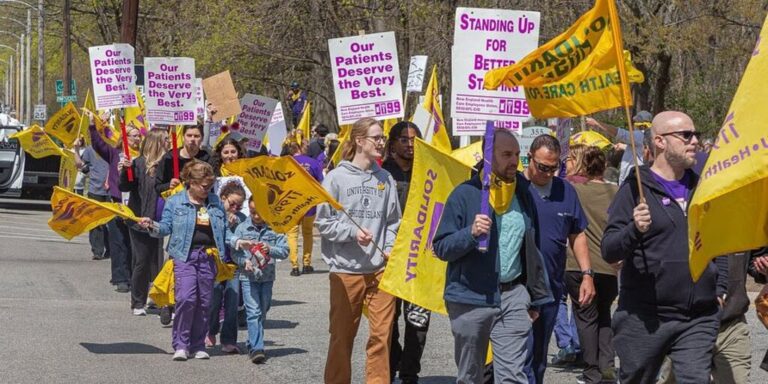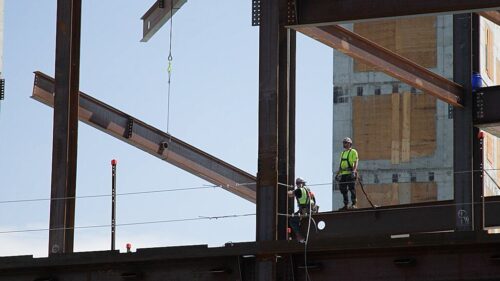PROVIDENCE — Staff at Butler Hospital in Providence will strike beginning Thursday as workers attempt to secure a new contract with the psychiatric facility’s owner, Care New England.
Workers are seeking a contract that addresses concerns about increased workplace violence, counteracts staffing shortages, and provides higher pay, their union said.
Service Employees International Union (SEIU) District 1199 said the hospital’s union bargaining committee announced their intention to strike in late April. Last week, 91 percent of the hospital’s 800-employee frontline staff voted to authorize a strike.
It’s been decades since hospital-wide strikes among frontline workers rocked Care England. The last strike at Butler that involved workers represented by SEIU took place nearly 30 years ago, according to union leaders. Within the Care New England network — the second largest hospital system in Rhode Island — there was a lock-out at Women & Infants Hospital in 1998 that lasted three weeks.
Dawn Williams, a registered nurse and negotiating committee member, said the decision was not taken lightly, “but we know [it’s] necessary to make the drastic improvements we need to feel safe at work.”
Patient assaults on workers that required medical attention have increased fourfold between 2021 and 2024, according to logs of work-related injuries held by the Occupational Safety and Health Administration. SEIU negotiating committee submitted contract proposals on May 7, but hospital management has not yet responded, according to union spokeswoman Amelia Abromaitis.
Williams called the workplace violence an “epidemic” staff “experience almost daily.”
“At the end of the day, if we don’t solve these core issues, it is our patients who will suffer the consequences from the revolving door of staff who refuse to put their safety in jeopardy for the low wages we earn,” said Williams.
Butler is a treatment, teaching and research hospital for psychiatric, movement and memory disorders.
Butler is a 168-bed treatment, teaching and research hospital for psychiatric, movement and memory disorders.
According to SEIU District 1199, bargaining between the union and Care New England began in March, and the most recent contract expired on March 31, as the parties have so far been unable to make “any meaningful progress” on key issues.
On May 12, the union filed unfair labor practices against Butler, claiming Care New England has failed to bargain in good faith; surveilled workers as they engage in union activity; threatened, coerced and retaliated against workers for protected union activity; and made unilateral changes to their conditions of employment after their contract expired.
The hospital has also fallen short of providing adequate wages for its staff, the union alleges, citing how 60 percent of its members reported struggling to afford food and housing costs. The workforce also suffers from “chronic short staffing,” according to the union, which said in April there were 116 open positions at Butler.
“Low wages are the key reason staffing is so short and turnover is so high,” said Dan Camp, a union member who works in behavioral health call intake at the hospital.
“We have Butler staff who are struggling to feed their family and even living out of their cars — when people are worried about their basic needs it reduces the quality of the care and support we can provide,” Camp said.
Raina C. Smith, a spokesperson for Care New England, said at the time of the vote that the hospital was “deeply disappointed” by the union’s plans of a walkout, and that executives at Butler had done “everything possible” to avoid a strike.
Executives had presented proposals that address workplace violence and offered a “total rewards package,” which include what Smith called “generous wage increases” and a competitive package.
The Globe requested more information from both Care New England and SEIU regarding the details of their workplace safety proposals, but they have not yet responded.
“Striking will not bring us closer to an agreement,” Smith said. “It will only result in lost wages for employees.”
Earlier this month, the union sought an average wage increase of 79.3 percent from the current rates over a two-year period, Smith said. In response, the hospital offered increases between 15.6 and 32 percent over the course of a four-year contract, but the union “offered no meaningful response” to the counterproposal, Smith said.
Both the union and the hospital said they remain committed to reaching a new contract. On Tuesday, Smith said the hospital recommended using the Federal Mediation and Conciliation Service and added it is “hopeful that FMCS’s involvement will help move the parties toward an agreement.”
The hospital will be open during the strike and has contracted with a third-party vendor to ensure patient care continues uninterrupted, Smith said.
“We urge the union to reconsider this path and return to the bargaining table prepared to engage in productive dialogue,” Smith said.
According to SEIU, the health system is spending $1.8 million on contracted workers.




Comment count: